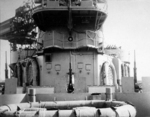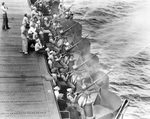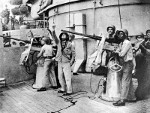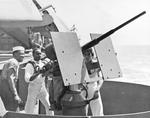20 mm Oerlikon Anti-Aircraft Gun
| Country of Origin | Switzerland |
| Type | Anti-Aircraft Gun |
| Caliber | 20.000 mm |
| Length | 2.210 m |
| Barrel Length | 1.246 m |
| Weight | 68.000 kg |
| Rate of Fire | 450 rounds/min |
| Ceiling | 2.000 km |
| Muzzle Velocity | 820 m/s |
Contributor: C. Peter Chen
ww2dbaseThis article deals with the land and ship-based anti-aircraft variants of the Oerlikon 20-millimeter weapon. For the design's aircraft autocannon applications, please see 20 mm MG-FF Oerlikon, Type 99 Mark 1, and Type 99 Mark 2.
During WW1, Reinhold Becker designed a 20-mm autocannon that saw limited use. In 1919, the firm Seebach Machinenbau Aktien Gesellschaft of Switzerland purchased the design, and the company was in turn taken over by another Swiss company, Werkzeug Maschinenfabrik Oerlikon. During the inter-war years, a wide range of variants were built, but it would be the anti-aircraft variant, especially those mounted on naval vessels, that would gain the design its popularity.
These 20-millimeter autocannons were single-barreled weapons operated by blowback. Ammunition was fed through the top, and empty cartridges were ejected from below. The triggers were located on the right handle. The aiming mechanisms were often the simple ring-and-bead sights. They fired explosive rounds that detonated on contact.
In 1937, Louis Mountbatten began voicing support for the introduction of Oerlikon weapons for the British Royal Navy, but it was not until 1939 when newly-appointed First Sea Lord Admiral Roger Backhouse expressed agreement with Mountbatten that the Royal Navy finally placed an order for 1,500 examples. Production delays in 1939 and the German conquest of France in 1940, however, meant the Swiss company could only deliver 109 examples; all of these 109 examples were mounted for land use. In early 1940, Britain purchased the rights to produce these weapons under license, and sent agents to Switzerland to smuggle out the technical drawings. The production of the first British-made Oerlikon autocannon started in Ruislip, London, England, United Kingdom at the end of 1940, and the first British-made guns were delivered to the Royal Navy in Mar or Apr of 1941.
Following the lead of the British Royal Navy, the Royal Canadian Navy also employed Oerlikon autocannon on naval vessels. Because Canadian vessels were often used in anti-submarine roles, there were many instances during which Oerlikon autocannon were depressed so that their explosive shells were used against German submarines sailing on the surface.
On the other side of the Atlantic Ocean, the United States Navy adopted Oerlikon autocannon in 1942. They were without a doubt an upgrade from the M2 Browning machine guns that they replaced, but by this period of WW2, they lacked stopping power against modern aircraft. While the Bofors 40-millimeter guns packed more punch against serious air attacks, Oerlikon autocannon continued to be employed in the US Navy in large numbers.
The Oerlikon design also used as the basis for the Polsten gun, designed by Polish engineers in exile in the United Kingdom. The gun went into service in 1944 and was used well into the 1950s , among other uses, on Cromwell tanks and early model Centurion tanks.
Despite their near obsolesence, Oerlikon autocannon remained in use aboard some naval vessels long after the end of WW2 as the last line of defense against incoming aircraft or missiles.
Source: Wikipedia ww2dbase
Last Major Revision: Jan 2008
20 mm Oerlikon Anti-Aircraft Gun Interactive Map
Photographs
 |  |  |  |
Did you enjoy this article or find this article helpful? If so, please consider supporting us on Patreon. Even $1 per month will go a long way! Thank you. Share this article with your friends: Stay updated with WW2DB: |
Visitor Submitted Comments
All visitor submitted comments are opinions of those making the submissions and do not reflect views of WW2DB.
- » WW2DB's 20th Anniversary (29 Dec 2024)
- » Wreck of USS Edsall Found (14 Nov 2024)
- » Autumn 2024 Fundraiser (7 Nov 2024)
- » Nobel Peace Prize for the Atomic Bomb Survivors Organization (11 Oct 2024)
- » See all news
 |
- » 1,150 biographies
- » 337 events
- » 44,024 timeline entries
- » 1,241 ships
- » 350 aircraft models
- » 207 vehicle models
- » 375 weapon models
- » 123 historical documents
- » 260 facilities
- » 470 book reviews
- » 28,582 photos
- » 432 maps
Winston Churchill, on the RAF
Please consider supporting us on Patreon. Even $1 a month will go a long way. Thank you!
Or, please support us by purchasing some WW2DB merchandise at TeeSpring, Thank you!
21 Oct 2009 12:52:12 AM
THIS IS A GUN THAT WILL HIT THE X ####